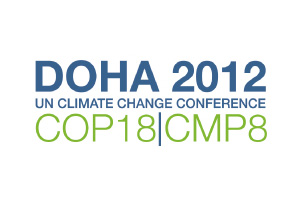
While all need to take their responsibility to address climate change, the world’s most advanced economies should take the lead, reducing emissions significantly.
Credits: UNFCCC
(Brussels/Rome, 22/12/2012) According to CIDSE and Caritas Internationalis, greater cuts in Green House Gas (GHG) emissions, money on the table to support the vulnerable communities most affected by climate change, and a clear work plan towards a global climate deal in 2015 are the main ingredients for a successful COP18 climate summit in Doha, Qatar (26 November -7 December 2012).
In order to pave the way towards a fair, effective and binding new climate deal in 2015, CIDSE and Caritas Internationalis, which represent 180 Catholic development agencies from North and South, say that Doha must deliver serious commitments and concrete progress.
While all need to take their responsibility to address climate change, the world’s most advanced economies should take the lead, reducing emissions significantly. The Kyoto Protocol is currently the only binding global tool to reduce emissions, but many of the world’s biggest GHG emitters either don’t take part in it or withdraw from the treaty as a second commitment period of the Protocol starts in January 2013.
“Too few with too little ambition: that is the main problem. The new World Bank report showing that we are on our way to a +4 degrees Celsius world is only the last of a series of alarm bells that all countries must react to. We need deeper emission cuts and sustainable low carbon economies to protect the most vulnerable people already suffering increasingly extreme weather and to safeguard future generations,” CIDSE Secretary General Bernd Nilles said.
In 2010, developed countries created the Green Climate Fund (GCF), pledging $100 billion per year by 2020 for climate needs in developing countries. In December this year the first period of climate finance ends, but there is no assurance about the future of finance from 2013 onwards.
“The world’s poorest and most vulnerable people, especially smallholder farmers in developing countries, who suffer the consequences of a problem others created, need to be at the heart of the climate negotiations. But how are these talks supposed to advance if rich countries retract the promises made to support their efforts to adapt to climate change?” Caritas Internationalis Secretary General Michel Roy said.
Contact
For more information or to set up interviews (in various languages) with CIDSE and Caritas climate experts from South and North:
- Roeland Scholtalbers, [email protected], +32477068384. (In Doha, 2 to 9 December)
- Patrick Nicholson, [email protected], +393343590700
Notes to the editors
- CIDSE is an international alliance of Catholic development agencies. Its members share a common strategy in their efforts to eradicate poverty and establish global justice. www.cidse.org
- Caritas Internationalis is a confederation of over 160 Catholic charities working together for social justice and an end to poverty. www.caritas.org
- Agriculture in the Climate Talks and the Food Security Imperative: Which Way to Just Solutions? Side-event at the UN Climate Talks in Doha, 28 November 2012, 20:15
